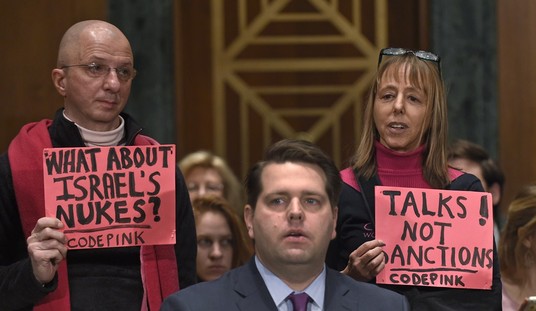
France, Germany, and Britain just took a key step towards following the path the United States blazed in May 2018 when President Trump announced that the United States was leaving the disastrous Iran Nuclear Deal because not only did it do nothing to constrain Iran’s nuclear program, it removed the economic sanctions that had held Tehran back from becoming a nuclear armed state supporter of terrorism.
European countries on Tuesday triggered a dispute mechanism in their nuclear deal with Iran, a move that could lead to the return of United Nations sanctions on Tehran.
Britain, France and Germany said that they had been “left with no choice” but to make the move.
Iran announced Jan. 5, after the U.S. killing of Maj. Gen. Qasem Soleimani, that it would no longer be bound by limitations on its nuclear energy program. (READ Iran Announces It Will No Longer Follow the Nuclear Agreement That It Never Really Followed Anyway.)
Tehran had been gradually reducing its commitments under the deal since the United States withdrew and reimposed sanctions in 2018. With Washington threatening secondary sanctions against European businesses dealing with Iran, Tehran argued it could no longer reap the financial benefits laid out in the pact in exchange for curbing its nuclear program.
By initiating the dispute mechanism, the Western European signatories begin a process that could eventually result in a “snapback” of U.N. sanctions, although officials made clear that such an outcome is not their current intention.
Instead, they appear to hope that triggering the process could help bring Iran back in line with its commitments under the 2015 agreement, which Tehran negotiated with the United States, Britain, France, Germany, Russia and China.
While the Germans made pleasing noises but there were strong signs that the UK was interested of following Trump’s strategy of withdrawing from the current corrupt bargain and engaging of a program of maximum pressure in order to convince Tehran to negotiate a more realistic and verifiable deal.
"Somehow or other, we've got to stop the Iranians acquiring a nuclear weapon" says PM Boris Johnson#BBCBreakfast https://t.co/4A3CjflbN3 pic.twitter.com/hmmWeX74f1
— BBC Politics (@BBCPolitics) January 14, 2020
“I think that would be a great way forward. President Trump is a great dealmaker, by his own account and many others, let’s work together to replace the JCPOA and to get the Trump deal instead.”
This is how it is supposed to play out. Under the agreement, the remaining signatories have 35 days to reach a resolution to the dispute. That time period can be extended and, I think, that is the first tell about what the real intention of the European partners. If the negotiation period is extended beyond 35 days, it is a sure signal that the Europeans are just engaged in theater and fully intend to stay in the deal come what may. If an agreement cannot be reached, the deal goes to the UN Security Council. If no agreement can be reached there, the UN sanctions that existed prior to the Iran nuclear deal will return. This is the so-called ‘snap back’ provision of the agreement.
Should the Euros not fold (stay with me here) and with a US administration that takes the sanctions business deadly serious, this could represent a literal existential crisis for the Tehran regime. Economic sanctions have been offset by a sense of national unity imposed by the security services. The killing of Qasem Soleimani showed the regime was not as invincible as it had led people to believe. The shootdown of a Ukrainian airliner has revealed the duplicity of the regime. Demonstrations are no longer the province of university students, they have been joined by working and middle class Iranians.
The irony of this is that while Iran has withstood the hostility of the United States since 1979, it might end up being brought down by a cascade of events that began with the killing of a US Defense contractor and was fed by Iranian hubris and incompetence and a long overdue US reaction to Iranian aggression.










Join the conversation as a VIP Member